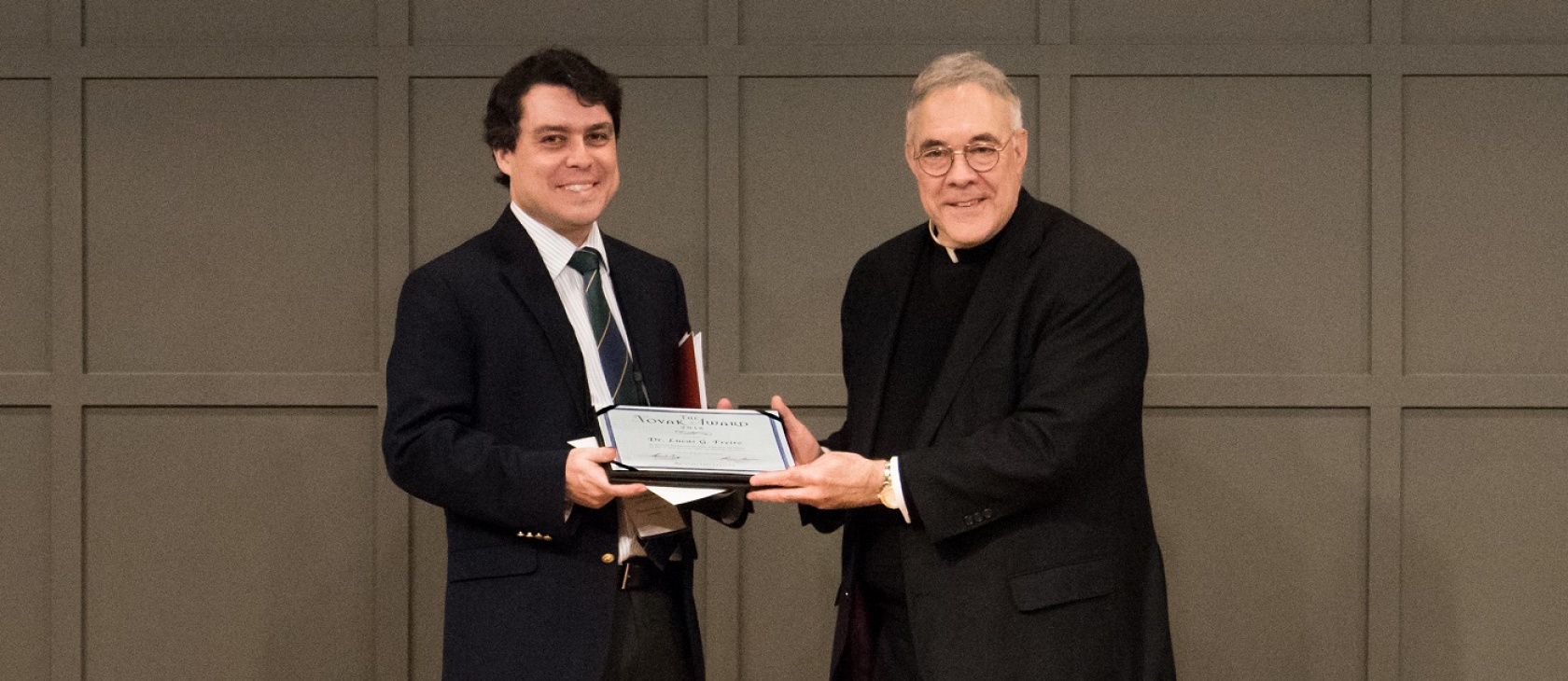Fr. Robert Sirico presented the Acton Institute’s 2018 Novak Award to Brazilian professor Lucas G. Freire on Monday, November 5. Freire’s acceptance speech offered reflections on the “idolatrous distortions” evidenced in modern public discourse by placing too much trust in the state, and too little faith in markets and individuals. He then presented insights from the Reformed tradition as expressed by Abraham Kuyper.
Fr. Sirico personally handed Freire – an assistant professor at Mackenzie Presbyterian University in São Paulo, Brazil, and a fellow at its Center for Economic Freedom – the $15,000 award for new research into religion, economic freedom, limited government, and human dignity.
Freire’s Calihan Lecture ended the first day of Acton’s two-day event titled, “Crisis in the Public Square: A Response from the Kuyperian Tradition.”
His probing, analytical address began by listing “surface problems” plaguing modern public discourse. A “crisis of dialogue” has come along due to a “loss of substance,” “the excessive personalization of public life,” identity politics, and incivility.
These maladies, he said, are symptomatic of deeper problems. Scholars share a uniformly “negative emphasis on individualism under liberal democracy and on globalization and the market economy.”
Their analysis breaks with the mature Christian tradition, Freire said, which saw the free market as cultivating human talents through cooperation:
[L]ater Reformational thinkers have come to see the fact of social differentiation as a good historical unfolding of God’s creation in response to the cultural mandate. A market economy is not inherently anti-social. To the contrary: the existence of a well-differentiated economic sphere in modern life has moved us ahead in our historical progress. … Taken this way, the market economy is a major asset that enriches our public square.
The market is a threat only when nations “lack an appropriate level of economic freedom to operate, and where there is much incentive to make use of economic power to purchase favorable political outcomes. Crony capitalism facilitates corruption, which, in turn, is a major source of popular disgust at the public square.” Cronyism created a political analogue in the government. “Too much power is concentrated, domestically, on the federal level and, internationally, in supranational bureaucracy,” he said.
Freire is careful to note that the problem cannot be ascribed to problems inherent to liberal democracy. “Nothing intrinsic to contemporary economic life undermines the public square, unless the government allows it to get away with crime and corruption,” he said.
Even the popular backlash against uncontrolled immigration, for which “Populists on the Left and on the Right denounce globalization,” ignores the fact that “certain countries attract more immigration precisely because they have a very centralized welfare state.”
Instead, he said, “we have come to expect too much of the political process and of our politicians,” citing Psalm 146:3. Making such minutiae as “identity issues, offensive speech, school curricula” the “objects of government control and judicial decisions” leads to “heated, emotional, and deeply personal debates and to a strong sense of urgency and of potential despair if we do not have it our way.”
“This need not be so, but we must learn not to commit everything in the public square to the hands of civil government,” he said.
At core, Freire said, fractious public discourse and increasing social polarization arises from a religious deficiency – or rather, an irreligious one. “The problem is not primarily political or cultural” but a modern society which “asks us to leave our Christian worldview out of the public square,” whether under the name of laïcité or the separation of Church and State. Freire said:
[W]e must not ignore the essentially religious root of the crisis we face in public life. We put our trust in the political process, subsuming our entire pursuit of authenticity and community to the political realm and misuse that inflated political system through centralization and concentration of power. A hyper-politicized and hyper-centralized public square are idolatrous distortions. We can only expect that they will lead those who are excluded from the process and its benefits to a feeling of despair or indifference.
His perceptive address also drew on the wisdom of Alexis de Tocqueville, Richard Sennett, Charles Taylor, Johannes Althusius, James W. Skillen, Hans Rookmaaker, anthropologist Manuel Castells, and (appropriately) Michael Novak. The full text will be printed in a forthcoming issue of Acton’s Journal of Markets and Morality.
The Novak Award named for the late groundbreaking scholar Michael Novak, has been made possible through the generosity of Joseph L. Calihan and family.
Freire made Acton history as the first person to accept the Novak Award inside the building of the Acton Institute in Grand Rapids, Michigan.
Previous Novak Award winners include Wim Decock (2017), Ryan Anderson (2016), Catherine Ruth Pakaluk (2015), Oskari Juurikkala (2014), David P. Deavel (2013), Giovanni Patriarca (2012), Hunter Baker (2011), Fr. Kęstutis Kėvalas (2010), Andrew Abela (2009), Carlos Hoevel (2008), Andrea Schneider (2007), Jan Kłos (2006), David M. VanDrunen (2005), Maximilian B. Torres (2004), Jude Chua Soo Meng (2003), Michael Casey (2002), and Arnaud Pellissier (2001).
Past honorees have hailed from France, Australia, Singapore, Spain, Poland, Germany, Argentina, Lithuania, Italy, Finland, Belgium, and the United States.
Learn more about the Novak Award here: https://acton.org/novak-award.
(Photo credit: Randi King, the Acton Institute)














